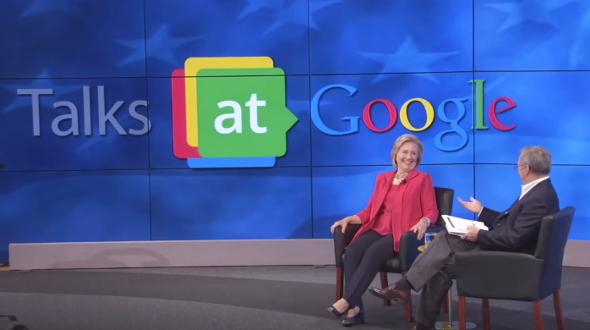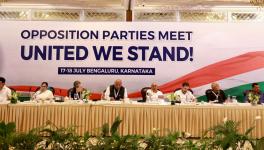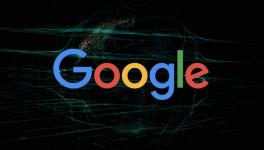If Google and Facebook can Flip Elections, Does Code Now Rule the Real World?
Internet users used to be worried about government control of the web, but the power of new digital empires suggests that the opposite may be true, writes Chris Spannos.
As the race for the 2016 US presidential candidacy heats up, research suggests that social media and search engine giants may be able to manipulate voter preferences for candidates. This far-reaching influence may not only affect the US but extend to elections in countries around the world.

Former US Secretary of State Hillary Clinton, now running for the 2016 Democratic Party presidential nomination, stopped by the Googleplex for a 'fireside chat' with Eric Schmidt, July 2014. by Youtube screenshot
Media outlets, including Forbes and New Scientist, are reporting that new digital technologies are profoundly affecting the decisions that people make. Not just decisions about what kind of toothpaste or coffee to buy, but decisions that affect societies as a whole – such as the US presidential elections. The research casts further doubt on the presumption that elections are free and fair.
The common, optimistic view of the democratic process is that voter preferences determine the outcome of elections. In close-calls, and in the interests of expediency, democracy can be replaced by the tossing of a coin, as happened in the Iowa Democratic caucus between Hilary Clinton and Bernie Sanders last February. The pessimistic view is that existing electoral systems are fundamentally and structurally flawed. Outrageous ‘political action committees’ (PACS and Super PACs) allow unlimited private donations to candidates, creating a bias toward the interests of the rich and powerful. Media conglomerates can apply their opinion-forming machines to the benefit of the owners’ preferred candidates.
Recent research points to new – potentially more powerful and not so clearly discernible – influencers. Robert Epstein, senior research psychologist at the American Institute for Behavioral Research and Technology and the former editor-in-chief of Psychology Today, warns of the ‘invisible’ power of social media and search engines to decide electoral outcomes. If ‘Google favours one candidate in an election, its impact on undecided voters could easily determine the election’s outcome,’ Epstein said this month. It is estimated that more than 60 per cent of the US population now gets its news through digital intermediaries such as Google, Facebook and Twitter. The reach of potential influence is therefore immense.
Epstein and his colleague Ronald E Robertson reported their findings in the Proceedings of the National Academy of Sciences (PNAS) in August 2015. They explained that Google search algorithms produce, what they call, a ‘Search Engine Manipulation Effect’ and the researchers made the astonishing calculation that ‘Google now has the power to flip upwards of 25 per cent of the national elections in the world with no- one knowing this is occurring.’
How did they arrive at this incredible assertion? They tested 4,556 undecided voters in the US and India. Their research methodology was rigorous, including double-blind studies – a technique designed to remove bias where neither researchers nor subjects of the experiment know who is really being tested. The tests were also carried out using randomized controlled experiments, designed to thoroughly determine if a cause-and-effect relation actually exists by randomly allocating subjects under the experiments. Their experiments found that:
-
biased search engine rankings can shift the voting preferences of undecided voters by 20 per cent or more;
-
the shift can be much higher in some demographic groups; and
-
search ranking bias can be masked so that people have no awareness of the manipulation.
Epstein estimates that, with or without deliberate planning on the part of company executives, Google’s search rankings have been impacting elections for years and that the impact is growing.
The practice of flipping elections is not new. Edward Bernays – the nephew of psychoanalysis pioneer Sigmund Freud and father of ‘public relations’ (known as ‘propaganda’ during his time) – worked with United Fruit and the CIA to foment public sentiment around the world against Guatemalan President Jacobo Árbenz, preparing the ground for a military coup against him in 1954. Under the rubric of ‘democracy promotion’, the US also used soft power strategies and tactics to subvert democracies and support dictatorships in Nicaragua, the Philippines, Ukraine and Haiti.
If Epstein’s research on the power of technology giants to influence ‘democracies’ on a grand scale is even reasonably accurate, his findings suggest that new digital empires are capable of carrying out upgraded versions of 20th century ‘soft power’. This new version of soft power is easily scalable to large or small populations and hides behind ‘search engine optimization’. Where traditional empires used civil and political organizations (as alternatives to, or prior to, the ‘hard power’ of military intervention) to flip election results, new digital emperors could flip election results to suit their own interests far more directly and covertly.
Proselytizing the positive role of the internet in society Google’s Eric Schmidt and Jared Cohen claimed, in their 2013 book The New Digital Age, that the creation and consumption of digital content in an online world of billions of people is the largest experiment in freedom. They claimed that the internet ‘is not truly bound by terrestrial laws’ and therefore is not only the ‘world’s largest ungoverned space’ but also ‘the largest experiment involving anarchy in history’.
A Google search provides the appearance of transparent and open results – of freely aggregated content. In reality, it produces ‘informed’ outcomes which are actually highly selective so that people make choices from among a limited set of options. Linguist and philosopher Noam Chomsky wrote in 1989 that in democratic systems ‘necessary illusions’ with regard to freedom and control ‘must be instilled in the public mind by more subtle means.’ The ‘more subtle means’ today lie in ‘Big Data’ and complex algorithms.
Writing in the New York Times, WikiLeaks editor Julian Assange offered a very different perspective. Assange argued that the ‘advance of information technology epitomized by Google heralds the death of privacy for most people and shifts the world toward authoritarianism.’ According to Assange the erosion of individual privacy and the corresponding centralization of power make ‘abuses inevitable’ and move ‘good’ societies closer to the ‘bad’ ones.
It is widely known that Silicon Valley elites support Hillary Clinton in her campaign to become the Democratic Party’s nomination for US president. Google has two companies that are helping her campaign strategy, The Groundwork and Civis Analytics. Google’s support for Clinton prompted Assange to say last year that Google was Clinton’s ‘secret weapon’.
Influence extends to other West Coast tech giants. Every day hundreds of millions of people willingly share revealing personal details about themselves, their family and friends on social networks. The US Department of Defense has studied extensively how to influence these users. And Facebook controversially sought to learn how to control user emotions by manipulating its news feed. The new-found power of social media and search engines is operating invisibly and on a scale that, according to Epstein, ‘is unprecedented in human history’.
In 2010 Facebook carried out an experiment asking 61 million US users to go vote in their congressional midterm elections. The company enabled a link that helped users find a nearby polling station and a button to click when they had voted. Consistent with its public relations campaign to project itself as a benevolent connector of communities, it added pictures of friends who had done the same. The results were astounding. In what the researchers labelled an experiment in ‘social influence and political mobilization’ they claimed that about 340,000 additional people turned out to vote because of this single Facebook campaign.
Reviewing the dangerous implications of this for the future of ‘digital gerrymandering’, Director at Harvard Law School’s Berkman Center for Internet & Society Jonathan Zittrain, put forward a thought experiment. Imagine a hotly contested future election in which Facebook chief executive Mark Zuckerberg personally favours a candidate that you don’t like. He arranges for a voting prompt to appear within the newsfeeds of tens of millions of active Facebook users however he uses the fact that Facebook ‘likes’ can predict political views and party affiliation. With that knowledge Zuckerberg chooses not to prompt users who are unsympathetic to his chosen candidate. Such manipulations, Zittrain hypothesized, would flip the outcome of our imagined election.
In order to prevent future manipulations of this type Zittrain advanced the concept of creating ‘information fiduciaries’. The idea proposes that companies entrusted with personal data and preferences act in the same way as lawyers and doctors behave when they obtain sensitive information about their clients and patients. Specifically, they are not allowed to use that knowledge for outside purposes. This position is so far removed from our current predicament, where the very profits of tech companies like Google and Facebook come from our data being interpreted and sold.
Harvard Law Professor Lawrence Lessig, who ended his campaign for the Democratic presidential nomination in November last year, identified the trend of the internet becoming an ever more regulated space more than a decade ago. Elaborating on the argument that ‘code is law’, Lessig explained that code can either be used to build a digital world to protect values that we believe are fundamental or we can code to allow those values to disappear. This matters because the internet used to be considered a free space where the main threat was government regulation and invasion of privacy.
But things have seemingly changed since the early days of the internet. As the power of the new digital empires to flip elections illustrates, the virtual world can now powerfully regulate the real world. Code can now either be used to advance the creation of informed and participatory democracies or it can be used to disappear or manipulate the appearance of information under massive datasets and complex algorithms. The capabilities of the new digital empires like Google, Amazon and Facebook seem to suggest that we have already travelled far down the latter road, without even noticing.
Courtesy: newint.org
Chris Spannos is Digital Editor at New Internationalist. The July/August issue of our magazine will be investigating the Digital Titans.
Disclaimer: The views expressed here are the author's personal views, and do not necessarily represent the views of Newsclick.
Get the latest reports & analysis with people's perspective on Protests, movements & deep analytical videos, discussions of the current affairs in your Telegram app. Subscribe to NewsClick's Telegram channel & get Real-Time updates on stories, as they get published on our website.
























